Learn the best ecommerce platforms and everything you need to know about them. If you want to get started right away, we recommend WP Engine paired with WooCommerce.
Our recommendation goes to WP Engine’s eCommerce solution for the best overall platform because of its ease of use and robust features.
When it comes to setting up an online store, choosing the right ecommerce platform is crucial for success. With so many options available, it can be overwhelming to decide which one is the best fit for your business needs. Fortunately, several top-rated platforms offer a range of features to help you build and manage your online store.
Whether you're just starting or looking to switch to a new platform, it's important to carefully evaluate your options and choose the one that best aligns with your business goals and budget. In the following sections, we'll take a closer look at the top ecommerce platforms and their features to help you make an informed decision.
Best Overall Ecommerce Solution WP Engine, paired with WooCommerce transforms your online store into a beautiful, fast, and secure shopping destination that your customers will love. Plus, it's super easy to use!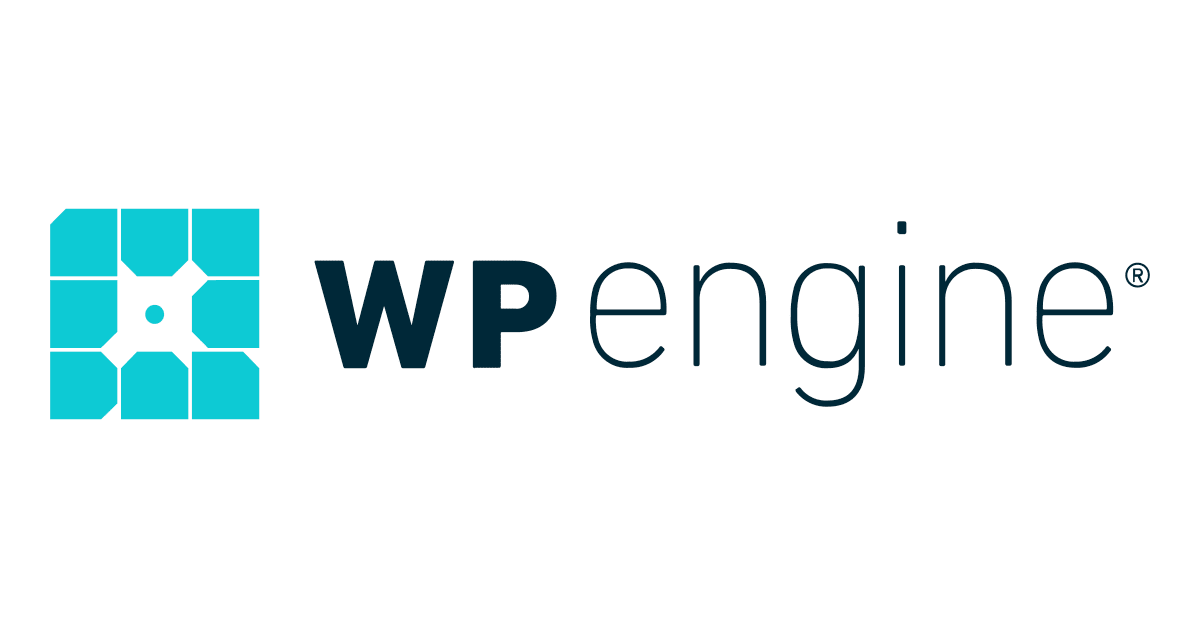
The Top 7 Best Ecommerce Platforms
- WP Engine - Best Overall Ecommerce Solution
- Shopify - Best Pure Ecommerce Platform
- Wix - Best Website Builder For Small Stores
- BigCommerce - Best For Stores With Extensive Inventories
- Squarespace - Optimal For Establishing A Unique Niche
- Weebly - Best Website Builder For Small To Medium-Sized Ecommerce Stores
- Hostinger - Best Value For Full-Featured Online Store Solution
1. WP Engine - Best Overall Ecommerce Solution
WP Engine, paired with WooCommerce, is like the fairy godmother of ecommerce websites. It magically transforms your online store into a beautiful, fast, and secure shopping destination that your customers will love. Plus, it's super easy to use! You don't need to be a tech wizard to manage your site on WP Engine. It's like having a personal assistant that takes care of all the technical stuff for you.
WP Engine enhances the WooCommerce platform by providing managed hosting services that are optimized for WooCommerce. WP Engine's hosting services are designed to improve the performance, speed, and security of WooCommerce stores. WP Engine's hosting infrastructure includes a global CDN, which ensures fast page load times, and automatic daily backups, which protect against data loss.
WP Engine also provides a range of tools and features that help WooCommerce store owners manage their stores more efficiently. These include a staging environment for testing changes before they go live, automatic updates for WordPress and WooCommerce, and 24/7 expert support. Additionally, WP Engine offers a range of WooCommerce-specific features such as automated tax calculation, real-time shipping rates, and integration with popular payment gateways.
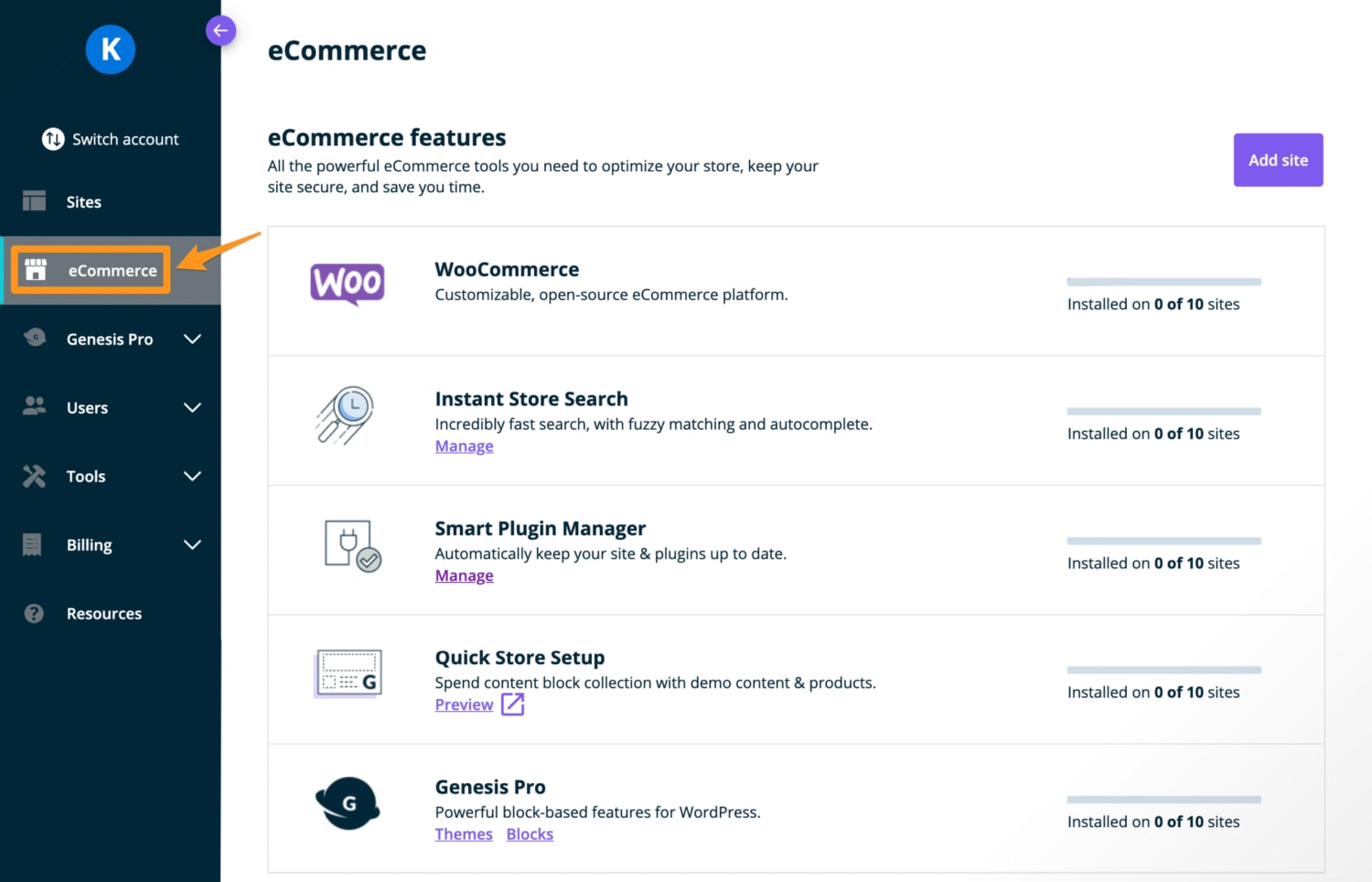
WP Engine Wins
- Lightning-fast page load times: WP Engine's servers are specifically optimized for WordPress, which means your site will load incredibly quickly. This is important because customers are more likely to abandon a site that takes too long to load.
- Rock-solid security to keep your site safe from hackers: WP Engine takes security very seriously and has a team of experts constantly monitoring for potential threats. They also offer features like malware scanning and automatic updates to keep your site secure.
- Automatic daily backups to ensure you never lose your data: WP Engine automatically backs up your site every day, so you never have to worry about losing your data. If something goes wrong, you can easily restore your site to a previous version.
- One-click restore points to easily roll back to a previous version of your site: In addition to automatic daily backups, WP Engine also allows you to create restore points whenever you want. This means you can easily roll back to a previous version of your site if you need to.
- Automatic caching to speed up your site even more: WP Engine automatically caches your site, which means it loads even faster for returning visitors. This is important because faster load times lead to happier customers.
- Exceptional uptime to ensure your site is always available to your customers: WP Engine's servers have an exceptional uptime record, which means your site will almost always be available to your customers. This is important because downtime can lead to lost sales and unhappy customers.
- Cloud platform flexibility to easily scale your site as your business grows: WP Engine's cloud platform makes it easy to scale your site as your business grows. You can easily upgrade your plan to accommodate more traffic or add more features to your site.
- Hassle-free managed hosting, so you can focus on your business instead of technical details: WP Engine takes care of all the technical details for you, which means you can focus on running your business instead of worrying about servers, updates, and security.
- Mind-blowing customer service that makes you feel like royalty: WP Engine's customer service team is available 24/7 to help you with any questions or issues you may have. They're known for their exceptional customer service and will make you feel like royalty.
WP Engine Drawbacks
- Higher cost compared to some other hosting providers: WP Engine is a premium hosting provider, which means it can be more expensive than some other options. However, the higher cost is often justified by the exceptional features and customer service they offer.
- Limited storage space: Depending on your plan, WP Engine may limit the amount of storage space you have available. This can be a concern if you have a large ecommerce site with many products and images.
- Limited number of websites per plan: Depending on your plan, WP Engine may limit the number of websites you can host. This can be a concern if you have multiple ecommerce sites or want to create additional sites in the future.
- Limited control over server settings: WP Engine is a managed hosting provider, which means they take care of all the technical details for you. However, this also means you have limited control over server settings and configurations.
- No email hosting: WP Engine does not offer email hosting, which means you'll need to use a third-party email provider. This can be a concern if you want to have a branded email address that matches your domain name.
It's worth noting that these potential drawbacks may not be a concern for every ecommerce site, and the benefits of using WP Engine may outweigh any potential drawbacks. Ultimately, it's important to carefully consider your needs and budget before choosing a hosting provider.
WP Engine Pricing
- Startup: This plan starts at $24 per month (billed annually) and includes one website, 25,000 visits per month, 50GB of bandwidth, and 10GB of storage.
- Professional: This plan starts at $50 per month (billed annually) and includes up to 3 websites, 75,000 visits per month, 125GB of bandwidth, and 15GB of storage.
- Growth: This plan starts at $94 per month (billed annually) and includes up to five websites, 100,000 visits per month, 200GB of bandwidth, and 20GB of storage.
- Scale: This plan starts at $233 per month (billed annually) and includes up to 15 websites, 400,000 visits per month, 500GB of bandwidth, and 50GB of storage.
- Dedicated: This custom plan’s pricing is based on user needs and can include 30+ websites, 400,000+ visits per month, 500+GB of bandwidth, and 50+GB of storage
Why We Recommend WP Engine
WP Engine, paired with WooCommerce, is a highly recommended option for ecommerce websites. WP Engine's managed hosting services are optimized for WooCommerce, providing improved performance, speed, and security for online stores.
WP Engine offers a range of tools and features that help store owners manage their sites more efficiently, including a staging environment for testing changes, automatic updates, and 24/7 expert support. Additionally, WP Engine's lightning-fast page load times, rock-solid security, and automatic daily backups make it a reliable and secure option for ecommerce sites.
WP Engine's exceptional uptime, cloud platform flexibility, and hassle-free managed hosting also make it a popular choice for ecommerce sites. WP Engine's customer service team is known for its mind-blowing service, assisting users 24/7.
However, WP Engine's premium services come with a higher cost compared to some other hosting providers, and there may be limited storage space and several websites per plan. Additionally, WP Engine's managed hosting means users have limited control over server settings, and the platform does not offer email hosting.
2. Shopify - Best Pure Ecommerce Platform
Shopify is a popular ecommerce platform that is designed for small businesses. It offers a wide range of features, including inventory management, customization, templates, site builder, web hosting, themes, marketing tools, payment processor, free trials, customer support, and more. Shopify is also known for its user-friendly interface and easy-to-use tools.
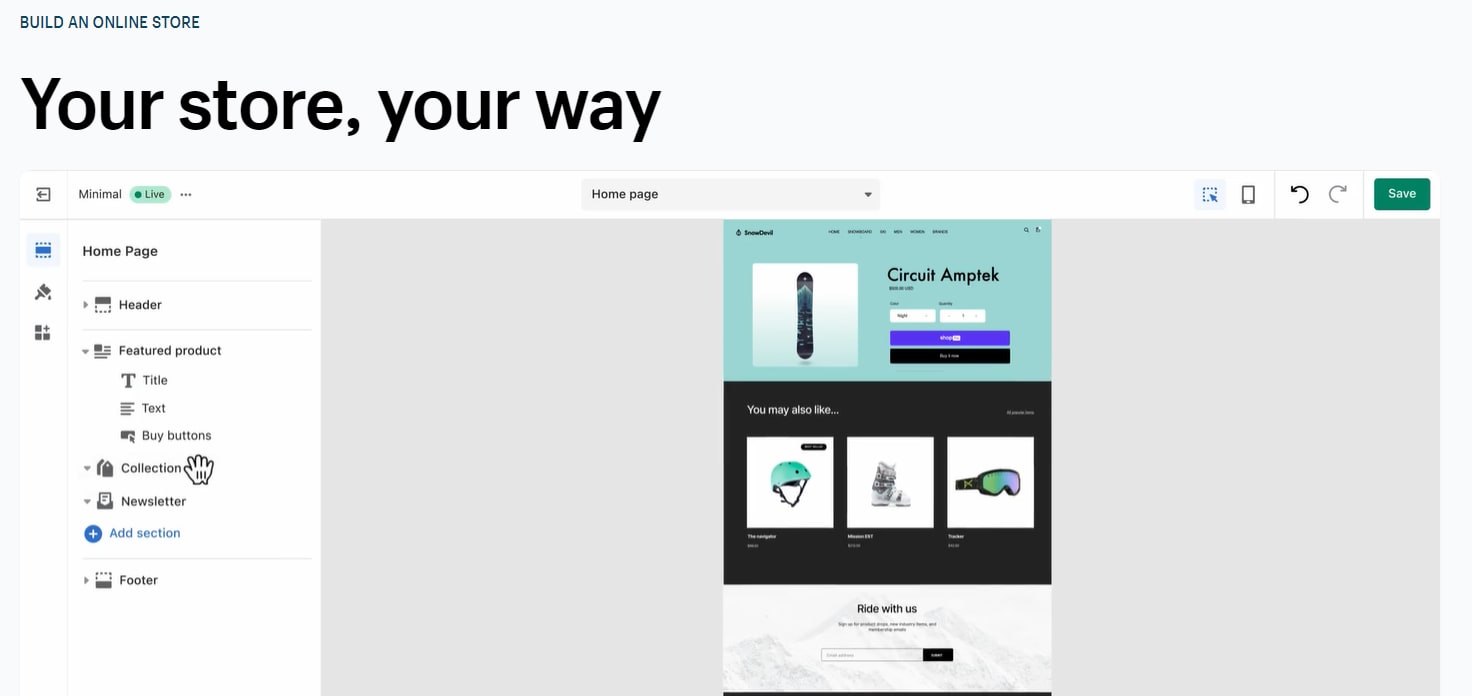
Shopify Wins
- Easy to use: Shopify is an incredibly user-friendly platform that allows even those with no technical background to set up an online store with ease. The platform offers a drag-and-drop interface that allows users to create a professional-looking website without any coding knowledge. Additionally, Shopify offers a wide range of customizable templates that allow users to create a unique online store that reflects their brand.
- Robust features: Shopify offers a range of features that make it an ideal choice for ecommerce businesses of all sizes. Some of the key features include inventory management, order tracking, payment processing, and shipping integration. Additionally, Shopify offers a range of marketing and analytics tools that allow users to track their store's performance and make data-driven decisions to improve sales.
- Scalability: Shopify is a highly scalable platform that allows businesses to grow without worrying about technical limitations. The platform offers a range of plans that cater to businesses of all sizes, from small startups to large enterprises. Additionally, Shopify offers a range of third-party apps and integrations that allow businesses to add new features and functionality as they grow.
Shopify Drawbacks
- Transaction fees: Shopify charges transaction fees for using third-party payment gateways, which can add up and eat into profits.
- Limited design flexibility: While Shopify offers a range of customizable templates, the design options can be limited for those who want a truly unique website.
- App reliance: While Shopify offers a range of features, some businesses may find that they need to rely on third-party apps and integrations to achieve the functionality they need, which can add to the cost of using the platform.
- Limited control over SEO: Some users have reported that Shopify's SEO options are limited, making it harder to rank highly in search engine results.
- Limited data export: Shopify's data export options can be limited, which can make it difficult for businesses to migrate to another platform if they decide to switch in the future.
Shopify Pricing
- Basic: This plan starts at $19 per month (billed annually) and includes basic reports, 2 staff accounts, and up to 1,000 inventory locations. It is best suited for individuals and small businesses.
- Shopify: This plan starts at $49 per month (billed annually) and includes professional reports, 5 staff accounts, and up to 1,000 inventory locations. It is best suited for small businesses wanting to level up their reporting and include more staff accounts.
- Advanced: This plan starts at $299 per month (billed annually) and includes a custom report builder, 15 staff accounts, and up to 1,000 inventory locations. It is best suited for medium to large businesses and offers the lowest transaction fees.
Why We Recommend Shopify
Shopify is a popular ecommerce platform designed for small businesses. It offers a range of features, including inventory management, customization, templates, site builder, web hosting, themes, marketing tools, payment processor, free trials, customer support, and more.
Shopify is known for its user-friendly interface and easy-to-use tools, making it easy for anyone to set up an online store. The platform also offers a range of customizable templates that allow users to create a unique online store that reflects their brand. Shopify's robust feature set, scalability, and ease of use make it an ideal choice for ecommerce businesses of all sizes.
However, Shopify does have some potential drawbacks, including transaction fees for using third-party payment gateways, limited design flexibility, app reliance, limited control over SEO, and limited data export options.
Are you curious about how Shopify and WooCommerce stack up? Check out our WooCommerce vs Shopfiy comparison.
3. Wix - Best Website Builder For Small Stores
Wix is a website development company that offers low and no-code website-building tools. It is a great choice for smaller stores, thanks to its affordable pricing and easy-to-use interface. Wix offers a drag-and-drop editor, which makes it easy to customize your site and add products. It also offers a range of templates, marketing tools, and payment processors.
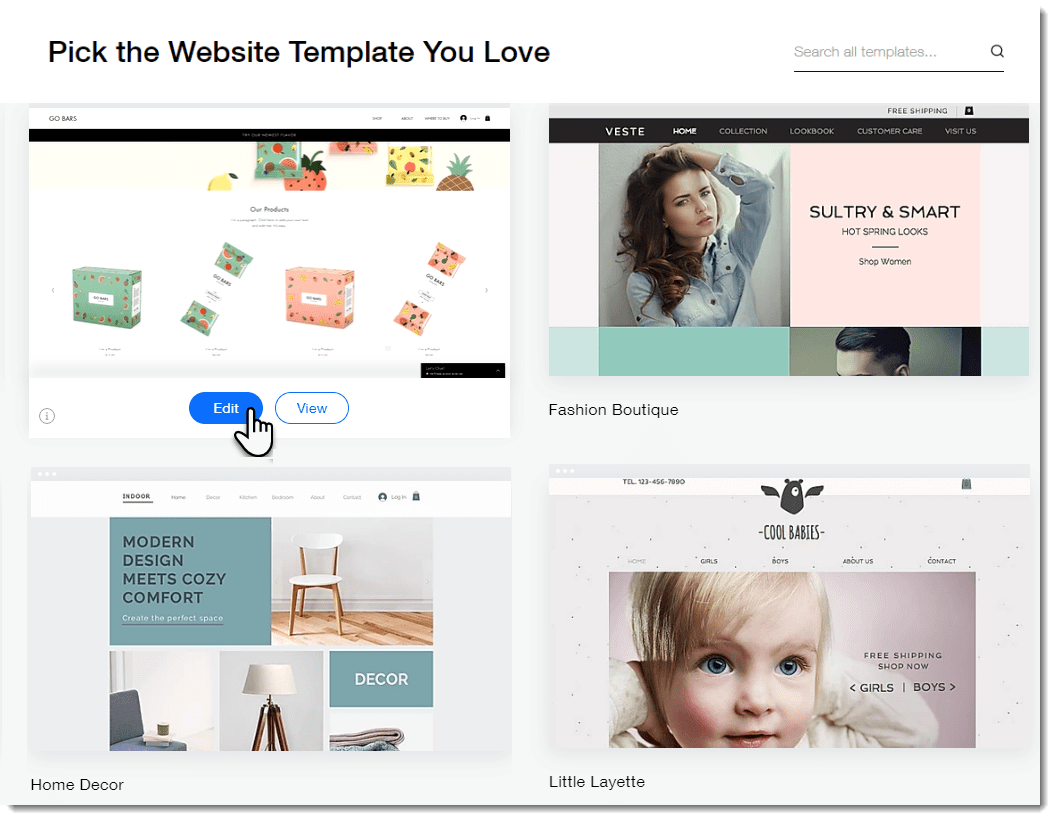
Wix Wins
- Easy to use: Wix is a user-friendly platform that allows you to create a beautiful and functional ecommerce website with no coding skills required.
- Customizable templates: Wix offers a wide range of customizable templates that allow you to create a unique and professional-looking online store.
- Mobile-friendly: All Wix templates are optimized for mobile devices, ensuring that your customers can easily shop on their phones or tablets.
- Payment options: Wix supports a variety of payment options, including PayPal, credit cards, and offline payments.
- Shipping options: Wix allows you to set up shipping options and rates based on your location and the location of your customers.
- Marketing tools: Wix offers a range of marketing tools, including email campaigns, social media integration, and SEO optimization, to help you promote your online store.
- Analytics: Wix provides detailed analytics that allow you to track your sales, traffic, and customer behavior, so you can make informed decisions about your business.
- Customer support: Wix provides 24/7 customer support via phone, email, and chat, so you can get help whenever you need it.
Wix Drawbacks
- Limited customization: While Wix offers a range of customizable templates, there are limitations to how much you can customize certain elements of your website.
- Limited scalability: Wix may not be the best option for large-scale ecommerce businesses, as it can be difficult to manage a large inventory and high traffic volume.
- Limited payment and shipping options: While Wix does support a range of payment and shipping options, there may be limitations depending on your location and the needs of your customers.
- Transaction fees: Wix charges transaction fees for each sale made through your website, which can add up over time.
- Limited SEO capabilities: While Wix does offer some SEO optimization tools, it may not be as robust as other ecommerce platforms.
- Limited third-party integrations: While Wix does offer some third-party integrations, there may be limitations depending on your specific needs.
Wix Pricing
- Business Basic: This plan starts at $9.50 per month and includes one website, up to 50,000 products, unlimited bandwidth, and 20GB of storage.
- Business Unlimited: This plan starts at $14 per month and includes one website, 50,000 products, unlimited bandwidth, visits per month, and 35GB of storage. With this plan, you can post up to 1,000 customer product reviews.
- Business VIP: This plan starts at $25 per month and includes a free website, up to 50,000 products, unlimited bandwidth, and 50GB of storage. You can also post up to 3,000 customer product reviews.
Why We Recommend Wix
Wix is a website development company that offers low and no-code website-building tools, making it a great choice for smaller stores. Wix offers a range of customizable templates, marketing tools, and payment processors, making it easy to create a beautiful and functional ecommerce website without the need for coding skills.
Wix is also mobile-friendly, supports a variety of payment and shipping options, and provides detailed analytics and 24/7 customer support. However, Wix does have some potential drawbacks, including limited customization, scalability, payment and shipping options, transaction fees, limited SEO capabilities, and limited third-party integrations.
4. BigCommerce - Best For Stores With Extensive Inventories
BigCommerce is a robust ecommerce platform that is designed for larger stores and enterprise-level businesses. It offers a wide range of features, including inventory management, customization, templates, site builder, web hosting, themes, marketing tools, payment processor, free trials, customer support, and more. BigCommerce is also known for its scalability and flexibility.

BigCommerce Wins
- Scalability: BigCommerce is a highly scalable platform that can accommodate businesses of all sizes, from small startups to large enterprises.
- Customization: BigCommerce offers a range of customizable templates and themes, as well as a robust API, allowing you to create a unique and professional-looking online store.
- Mobile-friendly: All BigCommerce templates are optimized for mobile devices, ensuring that your customers can easily shop on their phones or tablets.
- Payment options: BigCommerce supports a wide range of payment options, including PayPal, credit cards, and offline payments.
- Shipping options: BigCommerce allows you to set up shipping options and rates based on your location and the location of your customers, as well as integrate with major carriers like UPS and FedEx.
- Marketing tools: BigCommerce offers a range of marketing tools, including email campaigns, social media integration, and SEO optimization, to help you promote your online store.
- Analytics: BigCommerce provides detailed analytics that allow you to track your sales, traffic, and customer behavior, so you can make informed decisions about your business.
- Customer support: BigCommerce provides 24/7 customer support via phone, email, and chat, so you can get help whenever you need it.
BigCommerce Drawbacks
- Complexity: BigCommerce can be more complex than other ecommerce platforms, which may require more time and effort to learn and manage.
- Cost: BigCommerce can be more expensive than other ecommerce platforms, with higher monthly fees and transaction fees.
- Limited customization: While BigCommerce does offer a range of customizable templates and themes, there may be limitations to how much you can customize certain elements of your website.
- Limited third-party integrations: While BigCommerce does offer some third-party integrations, there may be limitations depending on your specific needs.
- Limited SEO capabilities: While BigCommerce does offer some SEO optimization tools, it may not be as robust as other ecommerce platforms.
Join The Break Community
BigCommerce Pricing
- Standard: This plan starts at $29 per month (billed annually) and includes up to 3 storefronts, up to 4 inventory locations, unlimited bandwidth, storage, and staff accounts. It allows for up to $50,000 in online sales per year.
- Plus: This plan starts at $79 per month (billed annually) and includes up to 5 storefronts, up to 5 inventory locations, unlimited bandwidth, storage, and staff accounts. It allows for up to $180,000 in online sales per year.
- Pro: This plan starts at $299 per month (billed annually) and includes up to 8 storefronts, up to 8 inventory locations, unlimited bandwidth, storage, and staff accounts. It allows for up to $400,000 in online sales per year.
- Enterprise: Custom pricing for large-scale businesses.
Why We Recommend BigCommece
BigCommerce is a robust and highly scalable ecommerce platform designed for larger stores and enterprise-level businesses. It offers a wide range of features, including inventory management, customization, templates, site builder, web hosting, themes, marketing tools, payment processor, free trials, customer support, and more.
BigCommerce also offers a range of customizable templates and themes, mobile optimization, payment and shipping options, marketing tools, analytics, and 24/7 customer support.
However, BigCommerce can be more complex and expensive than other ecommerce platforms, with higher monthly fees and transaction fees. There may also be limitations to customization and third-party integrations, as well as limited SEO capabilities.
5. Squarespace - Optimal For Establishing A Unique Niche
Squarespace is a popular website builder that also offers ecommerce functionality. It is a great choice for businesses that want a simple, streamlined ecommerce platform. Squarespace offers a range of templates, marketing tools, and payment processors. It also offers a user-friendly interface and easy-to-use tools.

Squarespace Wins
- Beautiful design: Squarespace is known for its beautiful and modern design templates, which can help your online store stand out and look professional.
- User-friendly: Squarespace is a user-friendly platform that allows you to create a functional ecommerce website with no coding skills required.
- Mobile-friendly: All Squarespace templates are optimized for mobile devices, ensuring that your customers can easily shop on their phones or tablets.
- Payment options: Squarespace supports a variety of payment options, including PayPal, credit cards, and offline payments.
- Shipping options: Squarespace allows you to set up shipping options and rates based on your location and the location of your customers.
- Marketing tools: Squarespace offers a range of marketing tools, including email campaigns, social media integration, and SEO optimization, to help you promote your online store.
- Analytics: Squarespace provides detailed analytics that allow you to track your sales, traffic, and customer behavior, so you can make informed decisions about your business.
- Customer support: Squarespace provides 24/7 customer support via email and chat, so you can get help whenever you need it.
Squarespace Drawbacks
- Limited customization: While Squarespace offers a range of customizable templates, there are limitations to how much you can customize certain elements of your website.
- Limited scalability: Squarespace may not be the best option for large-scale ecommerce businesses, as it can be difficult to manage a large inventory and high traffic volume.
- Limited payment and shipping options: While Squarespace does support a range of payment and shipping options, there may be limitations depending on your location and the needs of your customers.
- Transaction fees: Squarespace charges transaction fees for each sale made through your website, which can add up over time.
- Limited SEO capabilities: While Squarespace does offer some SEO optimization tools, it may not be as robust as other ecommerce platforms.
- Limited third-party integrations: While Squarespace does offer some third-party integrations, there may be limitations depending on your specific needs.
Squarespace Pricing
- Business: This plan starts at $23 per month and includes a free custom domain for the first year, unlimited bandwidth, drag-and-drop editor, and fully integrated ecommerce with a 3% transaction fee.
- Commerce Basic: This plan starts at $27 per month and builds on the Business plan with 0% additional transaction fees, point of sale, product reviews, accounts for customers, and more.
- Commerce Advance: This plan starts at $49 per month and builds on the Commerce Basic plan with advanced shipping and discounting, abandoned cart emails, subscription sales, and more.
Why We Recommend Squarespace
Squarespace is a great website builder that also offers ecommerce functionality. It is a user-friendly platform that allows you to create a visually appealing and practical online store with no coding skills required.
Squarespace offers a range of customizable templates, marketing tools, and payment processors, as well as mobile optimization, payment and shipping options, analytics, and 24/7 customer support.
However, Squarespace may not be the best option for large-scale ecommerce businesses due to limited scalability and transaction fees. There may also be limitations to customization, payment and shipping options, SEO capabilities, and third-party integrations.
6. Weebly - Best Website Builder For Small To Medium-Sized Ecommerce Stores
Weebly is another popular website builder that also offers ecommerce functionality. It is a great choice for businesses that want a simple, affordable ecommerce platform. Weebly offers a range of templates, marketing tools, and payment processors. It also offers a drag-and-drop editor, which makes it easy to customize your site and add products.
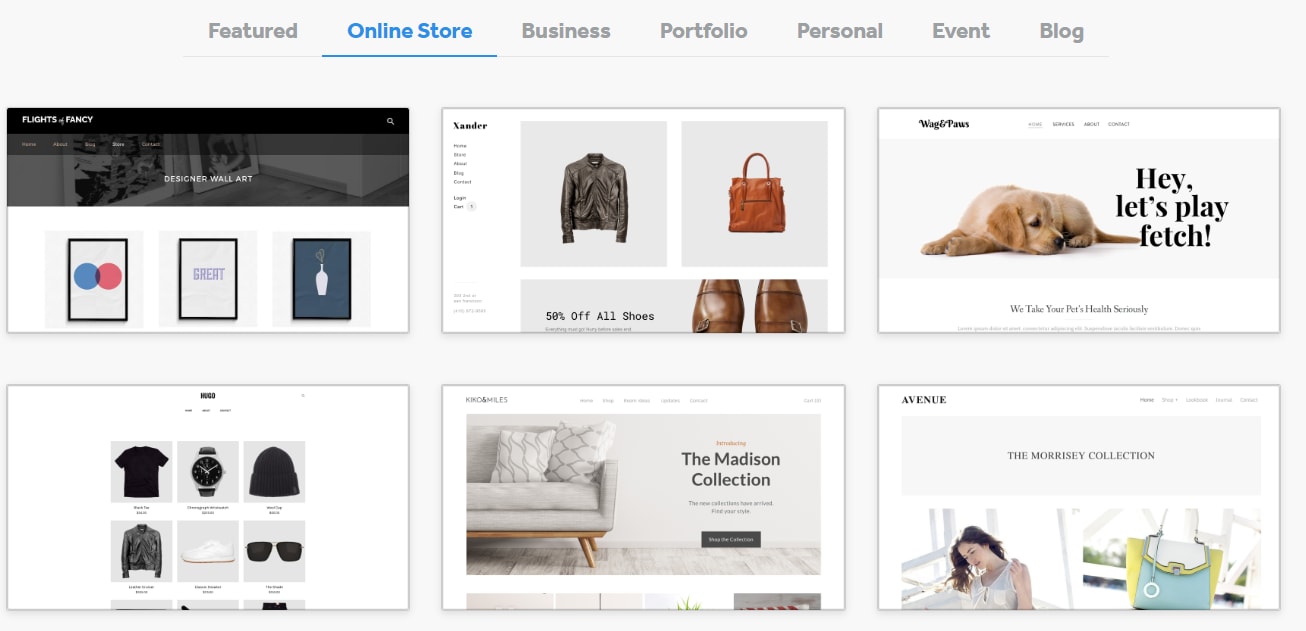
Weebly Wins
- Easy to use: Weebly is a user-friendly platform that allows you to create a functional ecommerce website with no coding skills required.
- Customizable templates: Weebly offers a range of customizable templates that allow you to create a unique and professional-looking online store.
- Mobile-friendly: All Weebly templates are optimized for mobile devices, ensuring that your customers can easily shop on their phones or tablets.
- Payment options: Weebly supports a variety of payment options, including PayPal, credit cards, and offline payments.
- Shipping options: Weebly allows you to set up shipping options and rates based on your location and the location of your customers.
- Marketing tools: Weebly offers a range of marketing tools, including email campaigns, social media integration, and SEO optimization, to help you promote your online store.
- Analytics: Weebly provides detailed analytics that allow you to track your sales, traffic, and customer behavior, so you can make informed decisions about your business.
- Customer support: Weebly provides 24/7 customer support via phone, email, and chat, so you can get help whenever you need it.
Weebly Drawbacks
- Limited scalability: Weebly may not be the best option for large-scale ecommerce businesses, as it can be difficult to manage a large inventory and high traffic volume.
- Limited customization: While Weebly offers a range of customizable templates, there may be limitations to how much you can customize certain elements of your website.
- Limited payment and shipping options: While Weebly does support a range of payment and shipping options, there may be limitations depending on your location and the needs of your customers.
- Transaction fees: Weebly charges transaction fees for each sale made through your website, which can add up over time.
- Limited SEO capabilities: While Weebly does offer some SEO optimization tools, it may not be as robust as other ecommerce platforms.
- Limited third-party integrations: While Weebly does offer some third-party integrations, there may be limitations depending on your specific needs.
Weebly Pricing
- Free: This plan is free and includes a Weebly subdomain. You can sell unlimited items (in the US only), and get access to most ecommerce features. The main drawbacks are that you cannot use a custom domain and it comes with ads.
- Personal: This plan starts at $10 per month (billed annually) and comes with the ability to connect a custom domain. Additional features include a shipping calculator, the ability to sell digital goods, and shipping labels.
- Professional: This plan starts at $12 per month (billed annually) and comes with a free domain. Additional features include advanced site stats, removal of ads, and phone support.
- Performance: This plan starts at $26 per month (billed annually) and includes all the features of the Professional plan as well as item reviews, PayPal payments, abandoned cart emails, and advanced insights.
Why We Recommend Weebly
Weebly is a popular website builder that offers affordable ecommerce functionality and is a great choice for businesses that want a simple and easy-to-use ecommerce platform. Weebly offers a range of customizable templates, marketing tools, and payment processors, as well as mobile optimization, payment and shipping options, analytics, and 24/7 customer support.
However, Weebly may not be the best option for large-scale ecommerce businesses due to limited scalability and transaction fees. There may also be limitations to customization, payment and shipping options, SEO capabilities, and third-party integrations.
7. Hostinger - Best Value For Full-Featured Online Store Solution
Hostinger is a web hosting company that also offers ecommerce functionality. It is a great choice for businesses that want an affordable, all-in-one solution. Hostinger offers a range of templates, marketing tools, and payment processors. It also offers a user-friendly interface and easy-to-use tools.
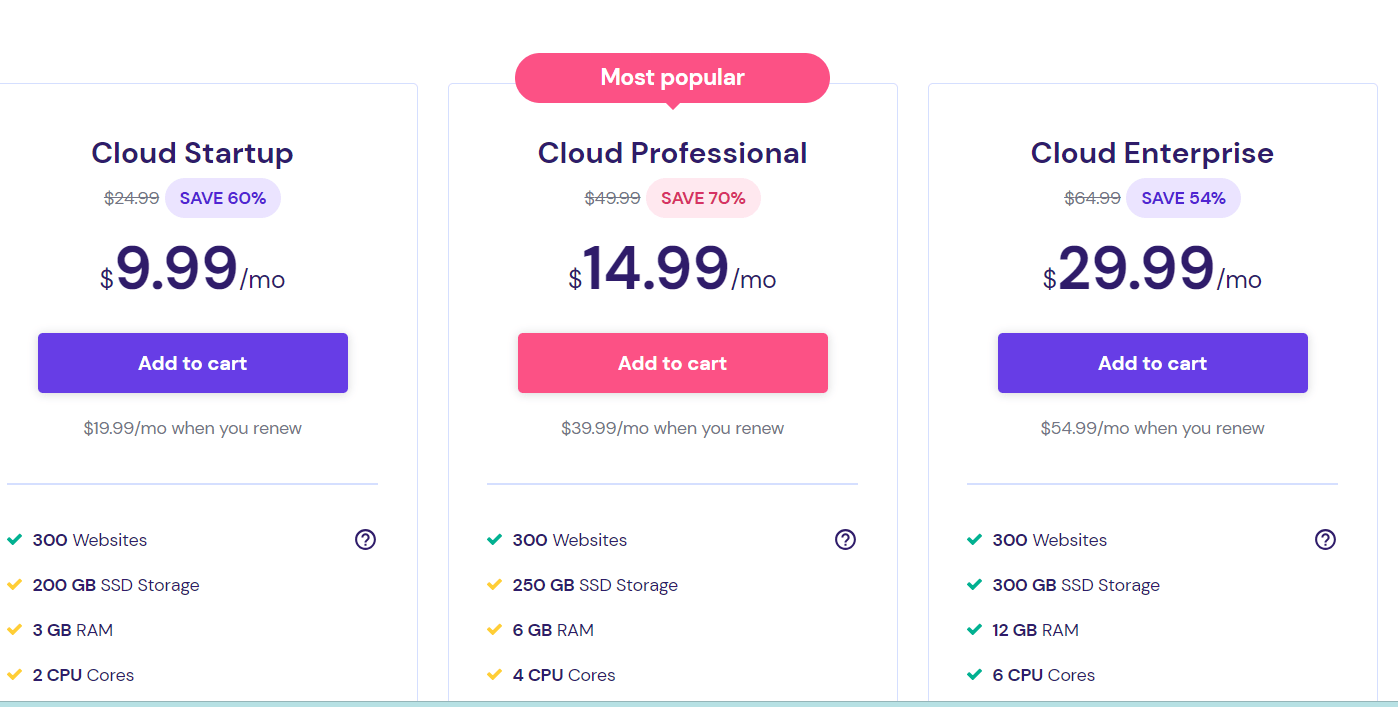
Hostinger Wins
- Affordable: Hostinger offers affordable pricing plans, making it a great option for small businesses or those on a budget.
- User-friendly: Hostinger is a user-friendly platform that allows you to create a functional ecommerce website with no coding skills required.
- Customizable templates: Hostinger offers a range of customizable templates that allow you to create a unique and professional-looking online store.
- Mobile-friendly: All Hostinger templates are optimized for mobile devices, ensuring that your customers can easily shop on their phones or tablets.
- Payment options: Hostinger supports a variety of payment options, including PayPal, credit cards, and offline payments.
- Shipping options: Hostinger allows you to set up shipping options and rates based on your location and the location of your customers.
- Marketing tools: Hostinger offers a range of marketing tools, including email campaigns, social media integration, and SEO optimization, to help you promote your online store.
- Customer support: Hostinger provides 24/7 customer support via email and chat, so you can get help whenever you need it.
Hostinger Drawbacks
- Limited scalability: Hostinger may not be the best option for ecommerce businesses with a large inventory or high traffic volume, as it can be challenging to manage and scale up.
- Limited customization: While Hostinger offers a range of customizable templates, there may be limitations to how much you can customize certain elements of your website. This can make it challenging to create a truly unique online store that stands out from the competition.
- Limited payment and shipping options: While Hostinger does support a range of payment and shipping options, there may be limitations depending on your location and the needs of your customers. This can make it difficult to offer a variety of payment and shipping options that appeal to a wider customer base.
- Limited SEO capabilities: While Hostinger does offer some SEO optimization tools, it may not be as robust as other ecommerce platforms. This can make it challenging to improve your online store's search engine rankings and attract more organic traffic.
- Limited third-party integrations: While Hostinger does offer some third-party integrations, there may be limitations depending on your specific needs. This can make it challenging to integrate with other tools and services that you may need to run your ecommerce business.
- Limited customer support options: While Hostinger does offer 24/7 customer support via email and chat, there may be limitations to the level of support provided. This can make it challenging to get the help you need when you need it, especially if you run into more complex issues.
Hostinger Pricing
- Cloud Startup: This plan starts at $9.99 per month (billed annually) and includes 300 websites. It comes with a free domain, free custom emails, eCommerce features, marketing integrations, and unlimited bandwidth.
- Cloud Professional: This plan starts at $14.99 per month (billed annually) and includes 300 websites. It comes with a free domain, free custom emails, eCommerce features, marketing integrations, and unlimited bandwidth.
- Cloud Enterprise: This plan starts at $29.99 per month (billed annually) and includes 300 websites. It comes with a free domain, free custom emails, eCommerce features, marketing integrations, and unlimited bandwidth.
Why We Recommend Hostinger
Hostinger is an affordable web hosting company that offers ecommerce functionality and is a great option for businesses that want an all-in-one solution. Hostinger offers a range of customizable templates, marketing tools, and payment processors, as well as mobile optimization, payment, and shipping options, and 24/7 customer support.
However, Hostinger may not be the best option for ecommerce businesses with a large inventory or high traffic volume due to limited scalability. There may also be limitations to customization, payment and shipping options, SEO capabilities, third-party integrations, and customer support options.
Selection and Review Process for the Best Ecommerce Platforms
When selecting the best ecommerce platforms, it is important to consider a variety of factors such as ease of use, pricing, features, and customer support. Here is how our team of experts selected the top ecommerce platforms.
How We Selected The Best Ecommerce Platforms
The selection process for the best ecommerce platforms involved evaluating each platform based on several key factors. These factors included:
- Ease of use: How easy is it for users to set up and manage their online store?
- Pricing: How affordable are the different pricing plans offered by each platform?
- Features: What features are available to help users manage their online store, such as inventory management, shipping, and payment processing?
- Customer support: How responsive and helpful is the platform's customer support team?
Based on these factors, the top ecommercee platforms for this year were selected.
Customer Reviews Of The Best Ecommerce Platforms
In addition to evaluating each platform based on key factors, customer reviews were also taken into consideration when selecting the best ecommerce platforms. By analyzing customer reviews, experts gained insight into the experiences of users who have already used the platform.
Customer reviews were evaluated based on several factors, including:
- Ease of use: Did customers find the platform easy to use and navigate?
- Features: Were customers satisfied with the features offered by the platform?
- Customer support: Did customers receive prompt and helpful support from the platform's customer support team?
What We Learned Reviewing the Best Ecommerce Platforms
After conducting extensive research and analysis, several key takeaways emerged regarding the best ecommerce platforms. Here are some of the main points that stood out:
- WP Engine paired with WooCommerce is a highly recommended option for ecommerce websites due to its optimized hosting services, improved performance, speed, and security.
- Shopify is a popular choice for small businesses due to its user-friendly interface, easy-to-use tools, and range of features.
- Wix is a great choice for smaller stores due to its low and no-code website building tools.
- BigCommerce is a robust and highly scalable ecommerce platform designed for larger stores and enterprise-level businesses.
- Squarespace is a user-friendly platform that allows you to create a beautiful and functional ecommerce website with no coding skills required.
- Weebly and Hostinger are affordable and user-friendly options with customizable templates, marketing tools, and payment processors.
- Each platform has its own potential drawbacks, such as limited scalability, customization, payment and shipping options, SEO capabilities, and third-party integrations.
Based on our research, we distilled everything we learned about ecommerce platforms into four key considerations:
Choosing the Right Ecommerce Platform Sets the Tone for Your Store
Choosing the right ecommerce platform is crucial for your store's success. The platform you choose will set the tone for your store and influence your customers' experiences.
WP Engine is a powerful platform that offers a variety of features that are perfect for ecommerce stores. It offers fast page load times, secure hosting, and reliable uptime, making it a great choice for stores of all sizes.
Wix is a website builder that is perfect for smaller stores that need to distinguish their products and services from the competition. It offers a variety of features that are designed to help you create a unique and engaging online store, including customizable templates, drag-and-drop design tools, and a variety of payment gateways.
Shopify is a pure ecommerce platform that is perfect for high-volume stores with complex inventory systems and multiple inventory locations. It offers a variety of features that are designed to help you grow your business, including advanced SEO tools, customizable checkout pages, and built-in marketing features.
Consider the Size of Your Store When Choosing an Ecommerce Platform
The size of your store is an important consideration when choosing an ecommerce platform. WP Engine is a great platform to consider for your ecommerce store, as it offers a variety of features that are designed to help you create a visually appealing and functional ecommerce store. It offers scalable hosting solutions that can grow with your business.
BigCommerce is another ecommerce platform that is perfect for high-volume stores with complex inventory systems and multiple inventory locations. It offers a variety of features that are designed to help you grow your business, including advanced SEO tools, customizable checkout pages, and built-in marketing features.
Focus on Your Niche Market When Choosing an Ecommerce Platform
It's important to remember that you are not competing for the entire market, but rather for your specific niche within that market. Squarespace is a website builder that is perfect for smaller stores. It offers a variety of features that are designed to help you create a well-designed and functional online store, including customizable templates, a variety of payment gateways, and built-in marketing features.
Weebly is another website builder that is perfect for small to medium-sized ecommerce stores. It offers a variety of features that are designed to help you create a professional and engaging online store, including customizable templates, a variety of payment gateways, and built-in marketing features.
Importance of Early Planning for Your Shipping Strategy
Your shipping strategy is an important part of your ecommerce business, and it's important to lock it down early. Shopify is a great platform to consider for your ecommerce store, as it offers a variety of features that are designed to help you manage your shipping strategy.
With Shopify, you can easily set up shipping rates based on weight, price, or destination, and you can even offer free shipping to your customers.
BigCommerce is another ecommerce platform that offers a variety of shipping features, including real-time shipping rates and a variety of shipping carriers to choose from.
Wix is a website builder that also offers a variety of shipping features, including the ability to set up shipping rates based on weight, price, or destination.
Squarespace is another website builder that offers shipping features, including the ability to set up flat-rate or real-time shipping rates. It's important to choose an ecommerce platform or website builder that offers the shipping features that are important to your business, so you can ensure that your shipping strategy is locked down early and running smoothly.
Frequently Asked Questions
What is the most successful ecommerce platform?
There is no one-size-fits-all answer to this question, as the success of an eCommerce platform depends on various factors such as the type of products being sold, target audience, budget, and marketing strategies. However, some of the most popular and successful eCommerce platforms this year are Shopify, WooCommerce, BigCommerce, and Magento.
Which is the best eCommerce website?
It depends on the specific needs of the business owner. Some popular ecommerce websites include Amazon, eBay, Walmart, and Etsy. However, creating a custom ecommerce website using a platform like Shopify or WooCommerce can offer more flexibility and control over the online store.
Is Shopify the best platform?
Shopify is a popular ecommerce platform that offers a range of features and tools for creating and managing an online store. However, it may not be the best platform for every business. It is important to consider factors such as budget, scalability, and customization options when choosing an eCommerce platform.
What is the best online selling platform for beginners?
For beginners, platforms like Shopify, Wix, and Squarespace offer easy-to-use interfaces and drag-and-drop editors for creating an online store. These platforms also offer a range of templates and themes to choose from, making it easier to create a visually appealing online store.
What is an open source ecommerce platform?
An open source ecommerce platform is a software system that is free to use and modify. This means that users can access the source code of the platform and make changes to it as needed. Popular open source ecommerce platforms include Magento, OpenCart, and PrestaShop.
Which platform should I choose for my ecommerce website?
The choice of ecommerce platform depends on the specific needs and goals of the business owner. Factors such as budget, scalability, customization options, and target audience should be considered when choosing an ecommerce platform. It is also important to research and compare different platforms to find the one that best fits the needs of the business.
Bottom Line
When it comes to choosing the best ecommerce platform for your business, there are a lot of factors to consider. From ease of use to pricing and features, each platform has its own strengths and weaknesses.
Based on the research, there are several ecommerce platforms that stand out from the rest. Shopify, for example, is a popular choice for its user-friendly interface and robust set of features. It's a great option for businesses of all sizes, from small startups to large enterprises.
WP Engine is a great option for ecommerce websites, especially when paired with WooCommerce. It offers efficient site management tools, automatic updates, and 24/7 expert support. Though its premium services come with a higher cost, WP Engine's exceptional uptime, cloud platform flexibility, and hassle-free managed hosting make it a reliable choice for ecommerce sites.
Ultimately, the best ecommerce platform for your business will depend on your specific needs and budget. It's important to do your research and compare different options before making a decision.
If you want to get started today, we recommend WP Engine paired with WooCommerce.













